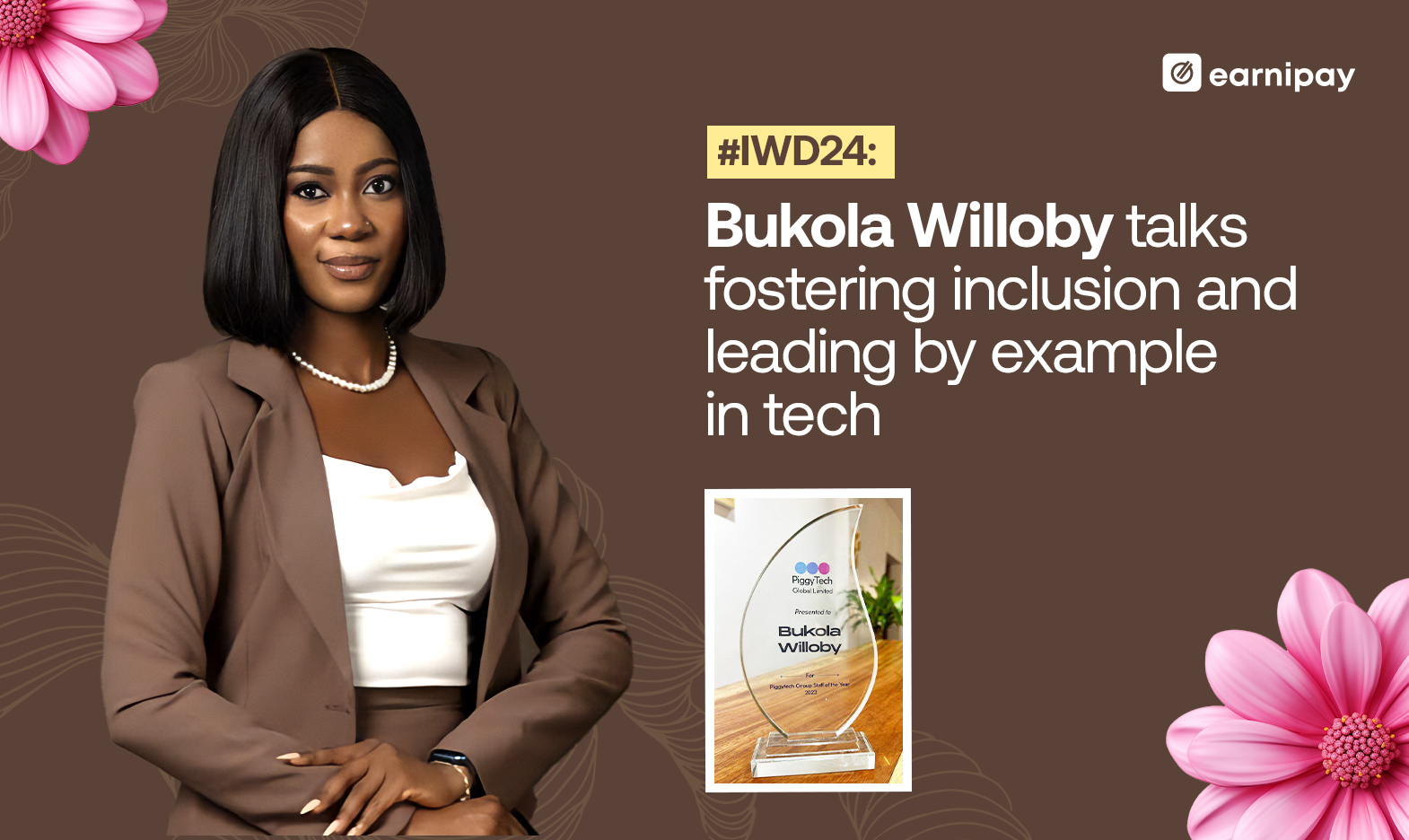In 2019, Bukola Willoby became a member of the PiggyVest team, coinciding with pivotal progress in gender diversity within the industry. Companies like Google, Microsoft, and Apple publicly acknowledged the gender gap in their workforce and committed to improving diversity and inclusion.
They released diversity reports and outlined initiatives to address disparities. Google, for example, announced new initiatives to increase the representation of women and underrepresented minorities in its workforce, including investing in STEM education programs. Such developments reflect the technology sector’s dedication to fostering diversity, equity, and inclusion.
At the time, Deloitte projected that by 2022—that’s four years later, major global tech companies would have achieved nearly 33% representation of women in their workforce. What a time to have been a woman working in tech.
Today, Bukola leads Customer Success at PiggyTech— that’s Piggyvest, Pocket, and Patronise, handling a user base of over 4.5 million people with a 60-person strong team. Bukola went from joining a team of four to building one of the largest teams in the company and one of the very best customer success teams in Nigeria. Her journey from joining the Customer Success team in 2019 to her current leadership role shows both her personal growth and the company’s commitment to promoting talent from within.
In an earlier interview, Bukola described her job as “the bridge between support, product, engineering, and other cross-functional departments in the company”. Customer success serves as an invaluable source of feedback, enabling continuous improvement and innovation. It influences a company’s reputation and success. It directly impacts customer satisfaction and retention, as well as brand image and perception. It is effective, as satisfied customers often fuel organic growth through positive word-of-mouth referrals.
In 2023, Bukola Willoby won Customer Success Manager of the Year at the No-Code Tech Summit and the overall PiggyTech Group Staff of the Year. For #IWD24: we speak about her career so far, inclusion, and progress within the tech industry.

How long have you worked in customer success, and what initially drew you to this field?
I’ve been in the customer success field for over six years. I love assisting people and always wanted to be at the frontline of an organization, so it was a no-brainer that I’d build my career in the customer success field and a customer-centric organization like Piggyvest.
Bukola tells me that she’s “constantly driving the delivery of exceptional service and creating processes to increase customer satisfaction and retention across board.” Six years in, I asked what changes Bukola had observed in the industry around gender inclusion since she began.
“There’s been more inclusion of women and a noticeable increase in the representation of women in the industry. More women-focused communities have emerged and these communities have provided a platform for networking, mentorship, and created opportunities specifically tailored to the needs of women in the field,” She says. “Companies now recognize the value of diverse perspectives and allyship to promote gender equality and inclusivity.”
Who do you think has been instrumental in advocating for women’s rights and opportunities in tech?
Dupe Olusola because she’s passionate about women in leadership, because of her work ethic, and because I have mad respect and love for her, but since we’re focused on tech, I’d say the likes of Amy Hood- CFO of Microsoft, Odun Eweniyi – Co-founder at Piggyvest and Partner at First Check supporting women-led startups in Africa.
Maya Horgan Famodu- Founder of Ingressive Capital supporting tech startups, initiatives like She-Code Africa celebrating and empowering young girls and women in tech across Africa. Sara Blakely supporting women empowerment initiatives across the world and many more that’s not coming to mind right now.”
How can the customer care industry further advance gender diversity and inclusion?
The CS industry can continue to drive gender diversity and inclusion by educating everyone on gender equality, unconscious bias, and gender diversity including non-binary people, and also by providing networking opportunities and empowering women.
By encouraging more women in leadership roles, they in turn can provide support and mentorship to others which would promote inclusion, career development, and growth in the industry.”

Before this, Bukola worked at Wema Bank/Alat as a Branch Service Associate looking to increase the branch’s profitability through customer satisfaction. Looking back on her career, she says she’d tell her younger self “to always follow her guts, cause 90% of the time it’s been right and led to the right direction”.
To women entering the industry, she’d advise them to just do it! Come correct, be confident in your abilities, and don’t let your fears keep you from setting and attaining higher goals.
#IWD24 Bukola Willoby Inclusion
What advice would you give to other team leads who are looking to promote and sustain inclusion within their teams?
My first advice to leaders would be to ‘practice what you preach’. Have a clear line for feedback, and create a safe and open line of communication between you and the team. Be empathetic, encourage inclusion and teamwork, and lead by example cos if you say A but it doesn’t reflect in your actions or you’re doing the opposite, the team will see you as a phony.
So ensure you’re leading by example, practice clear and effective communication, and lastly, remember to have fun!”
Like Bukola, other women in leadership positions within customer service are spearheading efforts to cultivate inclusive environments and recruitment practices. By fostering diverse teams, they aim to enhance service delivery to a broad customer demographic. This approach, often termed “leading with empathy,” underscores their commitment to understanding. The tradition of leading with empathy and compassion predates the modern-day workplace, as women have historically embodied these qualities. Not only do women apply these values within customer service roles, but they also bring them into executive decision-making settings.
To effectively confront this potential skill gap and prepare for the rise of emerging technologies, the untapped potential of women in the tech industry is paramount. A recent study by the World Economic Forum forecasts the creation of 150 million new technology positions worldwide within the next five years, with an estimated 77% of all jobs requiring digital skills by 2030.
By actively encouraging and empowering women to pursue careers in technology, we not only bridge the skills divide but also unlock numerous advantages for individuals, businesses, and society as a whole.





Leave a Comment